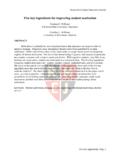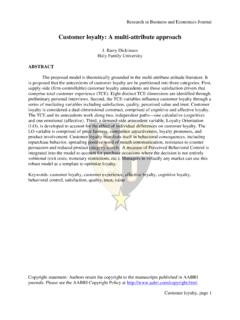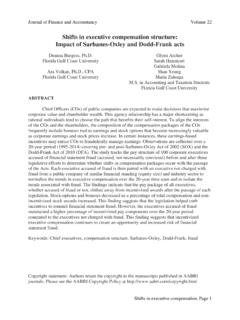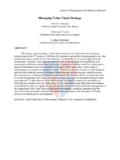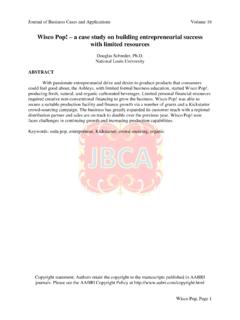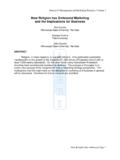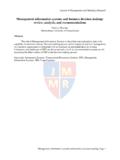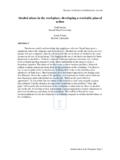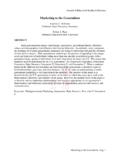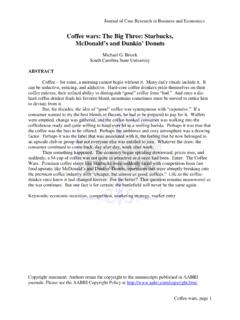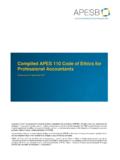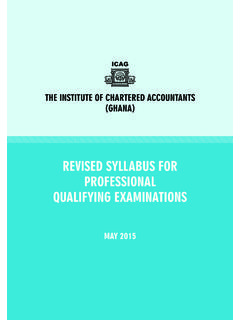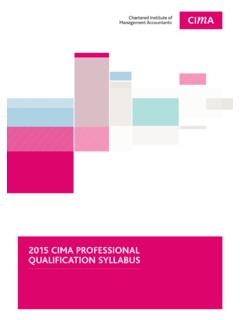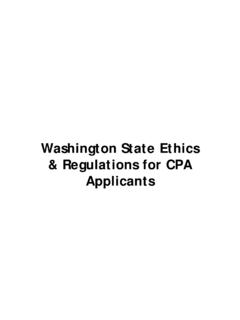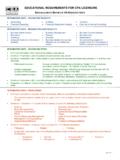Transcription of Financial reporting regulations, ethics and …
1 Journal of Academic and Business ethics Financial reporting regulations , ethics and accounting education George F. Kermis Canisius College Marguerite D. Kermis Canisius College ABSTRACT. It is important for accounting students to understand the interrelationship between personal ethics , professional ethics and Financial reporting regulations . ethics begins in accountability on multiple fronts: to the individual; to those who rely on that person, , family, colleagues, employers, and investors; those the person leads at work, , staff and teams; and those who lead the individual, , management, parents and spouses. There is a critical need for balance between all the expectations placed on an individual's ethical behavior so that the individual's integrity has both internal and external integrity.
2 Including the investors, the profession and society in general. accounting students also need to understand the importance of integrity in dealing with Financial reporting , which is articulated by the Sarbanes-Oxley (SOX) Act and the prescriptions of the Treadway Commissions' Committee on Sponsoring Organizations (COSO). SOX governs Financial reporting of public companies with debt or equity outstanding that are registered with the Securities and Exchange Commission (SEC). The key section of SOX that deals with integrity is Section 302 which presents factors involved with certifying disclosure controls and Section 404 which addresses factors involved with certifying management's internal control system.
3 The act reinforces the concepts of auditor independence, corporate governance and Financial disclosures. It also created criminal penalties for non-compliance and calls for companies to adopt a control framework such as those prescribed by COSO to help assure a company's Financial reporting integrity. With Sarbanes-Oxley Congress responded with more robust measures to insure the integrity of Financial reporting . In the words of previous Securities and Exchange Commission Chairman William Donaldson: Simply complying with the rules (SOX) is not enough. They should, as I. have said before, make this approach part of their companies' DNA. For companies that take this approach, most of the major concerns about compliance disappear.
4 Accountability, taking responsibility for one's actions, begins in the individual and transfers over to integrity in the workplace. Accountability motivates individuals and sharpens their focus. It also encourages innovation to stretch beyond the norm. The absence of accountability is likely to result in floundering, failure and lost opportunities. There will likely come a time during one's audit career when he or she will have to make a tough call to do the right thing or avoid the easy way as an auditor, controller, Financial reporting regulations , page 1. Journal of Academic and Business ethics CFO or regulator. The choice one makes reflects the personal code of ethics that the individual has created and transferred to the workplace.
5 The process of accountability begins with the individual and ultimately ends with the individual's determination of what is ethical or the right thing to do in a particular situation. Copyright statement: Authors retain the copyright to the manuscripts published in AABRI journals. Please see the AABRI Copyright Policy at Financial reporting regulations , page 2. Journal of Academic and Business ethics INTRODUCTION. The history of the need for ethics education for accountants begins with the failure of the technology bubble followed by the collapse of Enron, WorldCom and Arthur Anderson among others (Rockness and Rockness, 2010). The resulting lack of confidence in Financial information led Congress to enact the Sarbanes-Oxley (SOX) Act in 2002, including the creation of the Public Company accounting Oversight Board (PCAOB), both of which renewed pressure for accountants to have ethics education to improve the chances that practicing accountants make ethical decisions when confronted with difficult choices.
6 Despite this regulatory intervention, Financial failures continued as evidenced by the 2008-2009 corporate collapses such as Lehman, Bear Stearns, Wachovia, AIG, Fannie Mae and Freddie Mac. Clearly there is another dimension to integrity that goes beyond compliance with regulations . The question to be addressed in this paper focuses on the issues associated with the development of an ethical orientation to decision making. It is believed that ethical individuals are a critical element if organizations are to ..make this approach (compliance with SOX rules) part of their company's DNA as was prescribed by former SEC chair William Donaldson.
7 It will address the origins of moral conflict in accountants' decision making and consider approaches that could help in the development of the successful resolution of ethical dilemmas. It is difficult to gauge whether the situation in the accounting profession is worse today than in earlier times or simply disappointing when compared to the public's expectation of their behavior. Most research views this as a combination of the context in which decisions are made and the personal values of the individual making the decision. As Alan Greenspan, the former Federal Reserve Board chair, commented, It is not that humans have become any more greedy than in generations past.
8 It is that the avenues to express greed had grown so enormously. Effectively the opportunities for unethical behavior have increased as well as their consequences to investors and the public in general. The Sarbanes-Oxley Act of 2002. SOX has been recounted and evaluated from many different perspectives (Deloitte, 2012; Srinivasan, 2005; Staubus, 2005). It was passed into law on July 30, 2002 to ..protect investors by improving the accuracy and reliability of corporate disclosures ( Government, 2002). SOX prescribes a new set of expectations placed on corporate Financial reporting and the independent auditors who perform the attest function on annual corporate Financial statements the company's Financial position at a set point in time (the balance sheets) and for the reported years: the results of operations (the income statement), the changes in cash from all sources (the statement of cash flows).
9 And the changes in all equity accounts (including the statement of changes in retained earnings). Independent auditors examine the design and compliance of internal control systems as well as the documentation to support Financial statements which are generated by the management of the company and offered to various public constituencies, including investors. These results in the auditors' opinion on the overall fairness of the Financial reporting regulations , page 3. Journal of Academic and Business ethics information contained in the Financial statements -including footnotes which disclose additional details supporting the information contained in the primary Financial statements.
10 There remains a continuing problem with the proscriptions offered by SOX. A contribution to the breakdown in the intended effectiveness of SOX can be attributed to organizations that fail to make compliance with the requirements of Sox, especially Sec. 404 on Internal Control, a transformational event. Those organizations that take a minimalist approach of mere regulatory compliance run the risk of having history repeat itself with a further breakdown of established internal control systems and confidence in the Financial statements they generate. The decision to follow the letter rather than the spirit of SOX can be viewed as an example of an ethical dilemma being unsuccessfully resolved.
